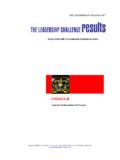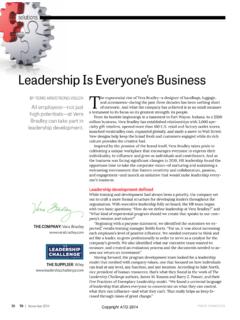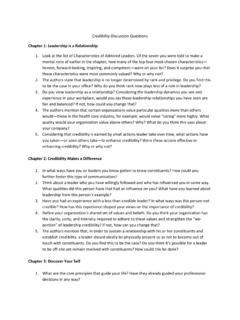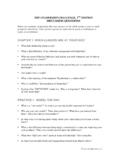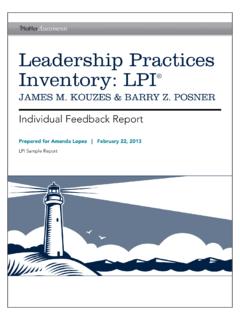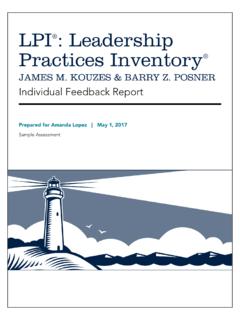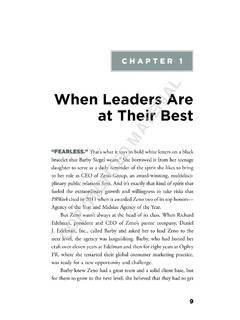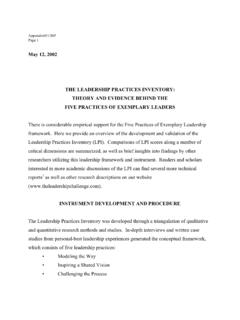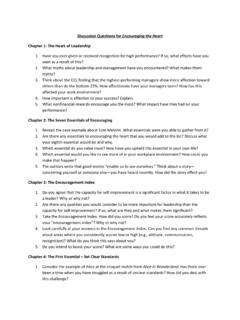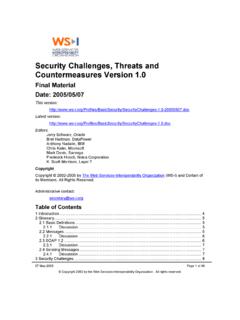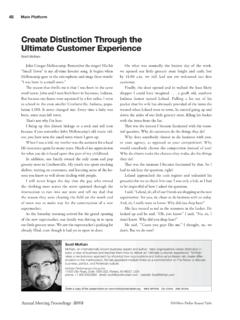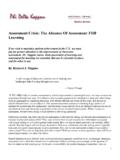Transcription of S S CHAPTER NINE - The Leadership Challenge
1 CHAPTER NINEI ntelThis case study describes the systematic approach employed by IntelCorporation s Fab 12 Organization Development Team (ODT) to successfullylaunch an innovative, nontraditional way of developing ODTworks at the manufacturing-site level (not corporate), responding to specificchallenges at Fab 12. Applying a rapid prototype design strategy, the ODT deliveredan in-depth Leadership development program, the Leadership Development Forum(LDF), using self-reflection and Action Learning as its primary learning DESCRIPTION219 PROGRAM EXAMPLE: SESSION BY SESSION221 Prep Session221 Session 1: Orientation221 Session 2: The Leadership ChallengeTM222 Session 3: Challenging the Process222 Session 4: Building Trust222 Session 5: Encouraging the Heart223 Session 6: Enabling Others to Act223 Session 7: The Vortex224 Session 8: Inspiring a Shared Vision224 Planning for Session 9224 Session 9: Modeling the Way225 IMPACT AND RESULTS225 Overall Results225 Evaluation 10/19/04 12:23 PM Page 213 Table : Self-Assessment Results,226by LDF Composite Evaluation ResultsWOW!
2 ProjectsTM: Examples227 Personal Testimonials228 LESSONS LEARNED229 CONCLUSION230 Exhibit : Four Stages of WOW! ProjectsTM231 Exhibit : Leadership Action Plan232 Exhibit : Leadership Autobiography233 ENDNOTES237 ACKNOWLEDGMENTS238 ABOUT THE CONTRIBUTORS238 OVERVIEWThe Leadership Development Forum (LDF) was first delivered in 1998 andreceived an overwhelmingly positive response from participants. Every LDFsince the pilot has generated a wait list of employees interested in improvingtheir Leadership skills. Participants of the fourth LDF program made an impas-sioned plea to Fab 12 s senior staff requesting that the staffattend LDF andmodel the way for the factory. As a result, the entire twenty-two-member seniorstaff attended LDF in 2000. Since its inception, eleven LDF programs have beendelivered at Fab 12 to a total of 204 middle (group leaders) and senior (depart-ment manager) level factory the first LDF was delivered to Fab 12 leaders only, subsequent pro-grams have included participants from other Intel business groups in an effort toproliferate LDF throughout the company.
3 In 2002, LDF was first piloted outsideof Fab 12 to Intel s Supplier Group and Corporate Quality Group. The partici-pants feedback about the program resulted in an expanded pilot to proliferateLDF on a large scale. LDF is now being offered to other Intel business groupsacross the United States and in 2000, the LDF program was highlighted at the corporate Intel Manufac-turing Excellence Conference (IMEC). IMEC, an annual event attended by aworldwide audience of five hundred selected Intel employees, shares papers,presentations, and exhibits to proliferate best known methods across thecompany. A rigorous selection process ensues to select the exhibits and pre-sentations (only eighty of 1,100 are selected). The focus of IMEC is primarilytechnical; however, due to LDF s unique design and success it was selected for214 BEST PRACTICES IN Leadership DEVELOPMENT AND ORGANIZATION 10/19/04 12:23 PM Page 214the conference.
4 The LDF program philosophy, key components, and results wereshared in a presentation following the conference s keynote speaker, Intel s vicepresident of manufacturing. IMEC established LDF as the premier leadershipdevelopment program throughout lessons learned are important for anyone in any organization coping withthe daunting Challenge of how to develop their management s 1997, Fab 12 s senior staff engaged in a series of work sessions andoff-site meetings to clarify operational priorities and plan for the long-term suc-cess of the factory. Within the staff, this process became known as the the Journey progressed, Leadership emerged as a key concern. The majorityof Fab 12 s middle level managers at that time had been employed by Intel forless than three years and had very little experience leading would Fab 12 provide the necessary Leadership to meet aggressive tech-nology ramps and high-volume manufacturing demands?
5 A corporate process todevelop Fab 12 s Leadership potential did not exist. The only courses in existenceat the time were (1) a Survey of Management Practices ,a360 assessment cus-tomized for Intel by the Booth Company,2and (2) Intel s corporate off-site, forty-hour management training program, Managing Through People, offered tomiddle and front line managers. Both of these courses focused solely on man-agement practices, not Leadership March 1998, Fab 12 s plant manager challenged the ODT to design anddeliver a factory-specific Leadership development program by Q3, 1998. Onemonth later, the ODT proposed delivering the Leadership Development Forumtwice a year to middle and senior level managers on a voluntary basis. LDF, afive-month program, would utilize and expand on Leadership content and activ-ities experienced in the overall purpose of LDF is to provide a learning process, not a training pro-gram, whereby participants assumptions about Leadership are challenged andtheir ability to affect change and meet factory performance goals is focuses exclusively on Leadership .
6 It makes the distinction, as noted byJohn Kotter, professor of management at the Harvard Business School, that lead-ership is about setting direction, aligning constituents, and inspiring others ver-sus the fundamental management skills of planning, budgeting, staffing, andproblem 10/19/04 12:23 PM Page 215 According to Warren Bennis, renowned author and professor of business atthe University of Southern California, One of the problems with standard lead-ership courses is that they focus exclusively on skills and produce managersrather than leaders, if they produce anything at all. Leadership is the ability tomeet each situation armed not with a battery of techniques but with opennessthat permits a genuine response. 3 LDF was formulated on the premise that Leadership is just as much aboutwho we areas it is about what we incorporating fundamental principlesof Leadership experts John Kotter, Warren Bennis, Terry Pearce, BoydClarke, Ron Crossland, Tom Peters, Ben Zander, Joel Barker, James Kouzes, andBarry Posner into the program s design, LDF serves as an inquiry into lead-ership versus a prescription on how to lead others.
7 The premise of LDF is thatleadership is a generative process best described in a Harvard BusinessReviewarticle by Tracy Gross: During our thirty-five years of research and con-sulting for and multi-national corporations, we have found in senior exec-utives, an unwillingness to think rigorously about themselves or their is not surprising that so many executives decline the invitation to reinventthemselves. There is another choice, but it requires a serious inquiry intooneself as a leader. This is not a psychological process of fixing somethingthat is wrong, but an inquiry that reveals the context from which we makedecisions. 4 LDF participants focus on what they are doing(applying Leadership practices,leading breakthrough projects) and how they are being(shifting paradigms,focusing on relationships, stepping out of comfort zones).
8 Participants are askedto let go of looking good and being right, and instead operate from an orienta-tion of leaders are learnerswho are vulnerable and take a stand for what is pos-sible. The ultimate purpose of LDF is for participants to improve themselves,their circumstances, and the lives of those around ODT established four primary program objectives and a firm set ofexpectations:1. Participants assumptions about Leadership are challenged by definingleadership as who you areand what you do,identifying leaders aslearners versus someone who knows, and demonstrating that leader-ship results from authenticity and Participants deeply reflect on and complete a one-page leadershipautobiography describing their purpose at work, their personal values,their vision for their organization, and the legacy they wish to PRACTICES IN Leadership DEVELOPMENT AND ORGANIZATION 10/19/04 12:23 PM Page 2163.
9 Participants develop and implement a Leadership action plan, enablingthem to apply the five practices of Kouzes and Posner s LeadershipModel on a current breakthrough project and their day-to-day Participants build a strong cross-functional network among are held accountable to uphold the following set of expectationsto ensure their total participation in LDF: Attend 100 percent of all sessions. (Participants must attend eachsession for the entire session, and are expected to be on time at thebeginning of each session and after breaks.) Complete all homework assignments. (Read articles, watch videos,complete assignments.) Provide specific feedback to other participants and program facilitators. Be willing to take risks. (Try new things, don t be afraid to make mis-takes, get out of your comfort zone, Challenge each other.)
10 Participate fully during LDF sessions and one-on-one coaching sessions. Listen from empty. (Come with questions versus answers, let go ofshowing other participants how effective you are and how much youknow about Leadership .) Speak up. (Many participants demonstrate weak public speaking abili-ties or are overly soft spoken; leaders speak up and are conscious ofhow their communication affects others.)Though seemingly trivial, much of the success of LDF can be linked to therigorous adherence to the program objectives and expectations. Participants whodo not comply with the expectations are asked to leave the program. When peo-ple are held accountable to honor their commitments, Leadership shows up. Dur-ing an LDF prep session, these expectations are made explicitly clear toparticipants setting the stage for the tenacious work of self-reflection and lead-ership develop LDF, the ODT adopted the following seven design LDF on the principle that Leadership is a self-discovery the ODT conducted research on Leadership , a consistent themeemerged: one is not taught Leadership ; Leadership is learned.
